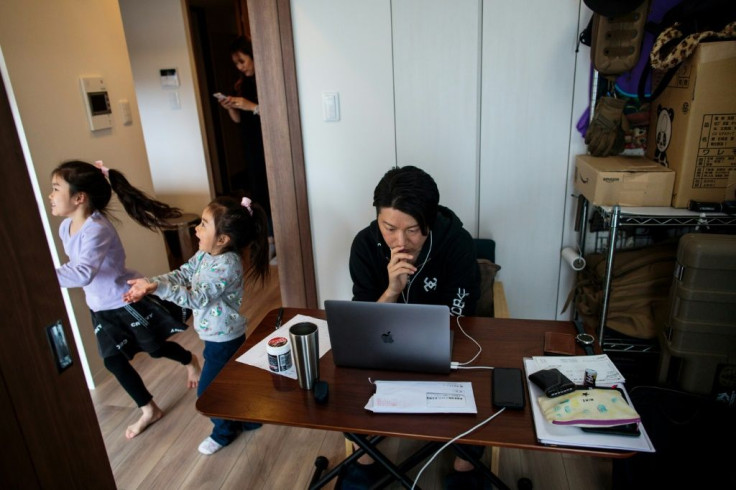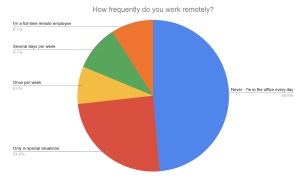Making Work At Home Work: Advice From Wrike's Andrew Filev

COVID-19 has disrupted our lives unprecedented ways. Many of us have been working under stay at home conditions for a month or more. We know the pandemic will eventually abate, but we don't know how quickly this will happen, or how the crisis will reshape the "new" normal over time.

One of the things we do know is that businesses that can do so are relying heavily on telecommuting and remote working to keep their operations going. According to SMB Group's Impact of COVID-19 on SMBs study, 80% of SMBs with existing work-from-home programs are now expanding them as they try to keep their businesses going. Meanwhile, among SMBs that lacked telecommuting options prior to COVID-19, 24% have now established them, and 29% plan to do so.
Although there are bound to be fits and starts as companies adapt, I believe that this shift will be a permanent one for many companies and employees.

With this in mind, I was interested in talking to Andrew Filev, Founder and CEO of Wrike, which offers a collaborative work management platform, about his views on collaboration, remote work and what it takes to create a productive online work environment. The company recently decided to offer its Professional Edition free for six months to help businesses maintain productivity and effective collaboration during the COVID-19 crisis, and also released a survey about remote working in the U.S.
Laurie: Thanks for sharing your thoughts on this. Why don't we start by talking about the survey you did? What did you learn that surprised you?
Andrew: One of the findings that struck me was the over half of the respondents we surveyed said that a work from home policy would seriously harm productivity, and over 40% don't think they can do their job as effectively working from home.

I was also surprised that nearly half of office workers didn't have the option to work from home. There's not really a good reason I can think of that knowledge workers shouldn't be able to work from home so long as they have the technology to do so. And while there's a long road ahead of us to return to normal, I hope that one of the long-term positive outcomes from this pandemic is that more employers will see the benefits of remote work to enable flexibility in their employee's lives.
Laurie: Yes, I agree that this will be one of the good outcomes from all of this. But as you noted, a lot of companies have been thrust into this. What advice can you share to help companies build strong, productive remote working teams?
Andrew: Remote work requires overcommunication to maintain alignment. Companies that establish processes or practices around remote work in their culture will have an easier time transitioning to asynchronous collaboration. We call it having a "Single Source of Truth" for work that's being done, both when it comes to what exactly needs to be done and the current status.
It sounds simple, but when things are moving at the current pace, keeping your source of truth in sync becomes an art in itself. You need to put more thought into taking notes, documenting tasks, and tracking statuses than you typically would. Otherwise, your team will spend a large part of their days just trying to obtain clarity, and not actually moving projects forward. That's why collaborative work management systems are getting so much growth and attention lately.
Laurie: What about how we communicate in the virtual world? What channels work best?
Andrew: I'm a big believer in choosing the right channel for communication, both for cultural and productivity reasons. Text is great for documenting action items and updates so they can be found later, but it's not the best at conveying emotions. Voice or video calls are more appropriate for delivering difficult feedback to an individual or a team to make sure they correctly understand the feedback and your tone while delivering it. On the other hand, sometimes a high-five gif is all you need to say "great job."
It's also is important to prioritize culture. At Wrike, we have "watercooler" channels for different teams designed to build cultural unity and keep things lighter during this crisis. Our team shares pictures of their home offices, life with their pets, and memes about working from home. We also do virtual happy hours, games, and even a virtual Netflix watch party. These are all important to keep your company's community strong and connected.
Laurie: You didn't mention email, which is something we all use, in the office and at home.
Andrew: Email is over 30 years old, and I think it's best used for conversations between two people. In today's digital workplace, most of our work touches several people in an organization. At that scale, emails fall apart quickly. They become difficult to follow, file versions get lost, action items are hard to pick out, and they end up buried in our inboxes among mountains of messages.
Emails are not good at visualizing the work that has been done or that still needs to be done. Those are just a few of the reasons why collaboration tools such as Wrike are designed to make it easier to have complex conversations, with multiple people. It helps you move tasks through repeatable processes with structure and accountability.
Laurie: So what technologies should small businesses consider using for virtual collaboration?
Andrew: I think the bare minimum is a collaborative work management software like Wrike for project planning and collaboration, a messaging app like Slack or MS Teams for real-time communications, and a video conferencing platform for meetings and face-to-face conversations.
Laurie: Getting back to the concern from your survey about virtual workers not being as productive. What methods do you recommend for measuring the productivity of remote employees?
Andrew: I'm a big fan of the OKR framework (objectives and key results), especially when they are documented and shared in a platform like ours. OKRs serve 2 purposes. One is helping your workforce know where to focus their time, and two is to help you measure the impact of their work. I am also a big fan of agile methodologies, as they keep teams in sync and moving fast.
Laurie: Your company, like most others, is having to adapt to this crisis. What are some things you recommend for keeping a company strong during these difficult times?
Andrew: A lot is going to be beyond your control, but you still have a big impact on how your company will come out on the other side of it. Take good care of your family and your team. Be thoughtful about how this situation will impact your business, be open about that, and address it together. Sometimes constraints breed ingenuity, and people are coming together to figure out how to best deal with the impact. I like to say that either you are managing the situation, or it manages you. When you lay out a clear plan, even if it's a tough one, a high degree of clarity will help your team feel hopeful about their ability to get good work done during a difficult time, rather than having them feel hopeless. And when you start tracking and celebrating progress on that plan, it will keep the confidence high.
Investing in digital culture will help everyone stay connected to a common sense of purpose, and feel like they are "in the trenches' with people they care about.
Laurie: How do you personally stay productive while working remotely?
Andrew: I am a big believer in focusing on one thing at a time. Things like noise-cancelling headsets and good music help with concentration, as does having a routine and agreement on that routine in the family. Now, I know that having a 4-yr old on your lap during a meeting with your boss would make that more complicated, and if you can't divide and conquer that with your partner, it would put you in a very tough spot. Luckily, even 4-yrs old are not always going 100%, and more bosses are more flexible and appreciative with their schedules.
I personally have a newfound perk in my home office routine--the chance to eat my lunch with my family. For me, it's actually two in one, because previously I rarely even had dedicated time for lunch, I was typically grabbing a bite during work meetings. While that's an accepted social norm in the office world, I haven't yet got comfortable chewing in front of my Zoom set-up.
And we've changed our exec team meetings from once a week to every morning, to stay in sync. And we are now sharing much more context through the day in our collaborative work management system.
Laurie: Shifting gears a bit, why is Wrike giving away free licensing during this time?
Andrew: We know that speed is the key for businesses and leaders who are trying to survive this time, and we're confident that our platform will help businesses execute faster. However, we also know that budgets will be tight, and discussions about cost for new software will ultimately slow down the decision to implement the tool. By giving the software away, we hope to remove those barriers and help teams get up and running.
Laurie McCabe is co-founder of SMB Group, a Boston-based research, analysis ,and consulting firm focused on technology adoption and trends in the small and medium business market.
© Copyright IBTimes 2024. All rights reserved.





















